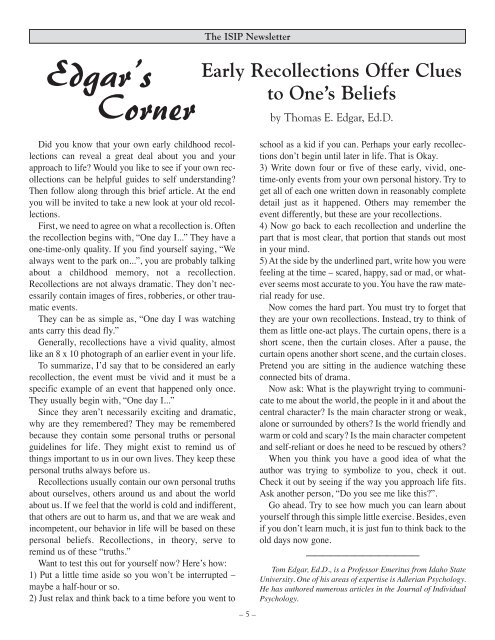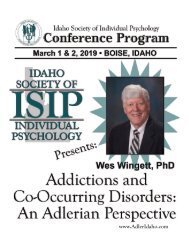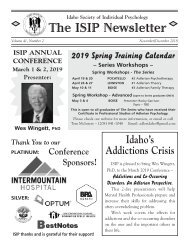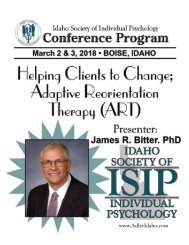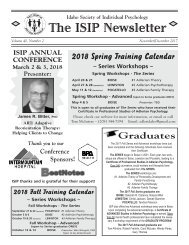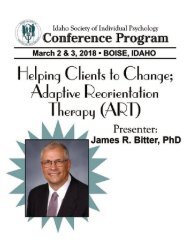ISIP-Jan-Feb-2018-Newsletter
Create successful ePaper yourself
Turn your PDF publications into a flip-book with our unique Google optimized e-Paper software.
The <strong>ISIP</strong> <strong>Newsletter</strong><br />
Edgar’s<br />
Corner<br />
Early Recollections Offer Clues<br />
to One’s Beliefs<br />
by Thomas E. Edgar, Ed.D.<br />
Did you know that your own early childhood recollections<br />
can reveal a great deal about you and your<br />
approach to life? Would you like to see if your own recollections<br />
can be helpful guides to self understanding?<br />
Then follow along through this brief article. At the end<br />
you will be invited to take a new look at your old recollections.<br />
First, we need to agree on what a recollection is. Often<br />
the recollection begins with, “One day I...” They have a<br />
one-time-only quality. If you find yourself saying, “We<br />
always went to the park on...”, you are probably talking<br />
about a childhood memory, not a recollection.<br />
Recollections are not always dramatic. They don’t necessarily<br />
contain images of fires, robberies, or other traumatic<br />
events.<br />
They can be as simple as, “One day I was watching<br />
ants carry this dead fly.”<br />
Generally, recollections have a vivid quality, almost<br />
like an 8 x 10 photograph of an earlier event in your life.<br />
To summarize, I’d say that to be considered an early<br />
recollection, the event must be vivid and it must be a<br />
specific example of an event that happened only once.<br />
They usually begin with, “One day I...”<br />
Since they aren’t necessarily exciting and dramatic,<br />
why are they remembered? They may be remembered<br />
because they contain some personal truths or personal<br />
guidelines for life. They might exist to remind us of<br />
things important to us in our own lives. They keep these<br />
personal truths always before us.<br />
Recollections usually contain our own personal truths<br />
about ourselves, others around us and about the world<br />
about us. If we feel that the world is cold and indifferent,<br />
that others are out to harm us, and that we are weak and<br />
incompetent, our behavior in life will be based on these<br />
personal beliefs. Recollections, in theory, serve to<br />
remind us of these “truths.”<br />
Want to test this out for yourself now? Here’s how:<br />
1) Put a little time aside so you won’t be interrupted –<br />
maybe a half-hour or so.<br />
2) Just relax and think back to a time before you went to<br />
school as a kid if you can. Perhaps your early recollections<br />
don’t begin until later in life. That is Okay.<br />
3) Write down four or five of these early, vivid, onetime-only<br />
events from your own personal history. Try to<br />
get all of each one written down in reasonably complete<br />
detail just as it happened. Others may remember the<br />
event differently, but these are your recollections.<br />
4) Now go back to each recollection and underline the<br />
part that is most clear, that portion that stands out most<br />
in your mind.<br />
5) At the side by the underlined part, write how you were<br />
feeling at the time – scared, happy, sad or mad, or whatever<br />
seems most accurate to you. You have the raw material<br />
ready for use.<br />
Now comes the hard part. You must try to forget that<br />
they are your own recollections. Instead, try to think of<br />
them as little one-act plays. The curtain opens, there is a<br />
short scene, then the curtain closes. After a pause, the<br />
curtain opens another short scene, and the curtain closes.<br />
Pretend you are sitting in the audience watching these<br />
connected bits of drama.<br />
Now ask: What is the playwright trying to communicate<br />
to me about the world, the people in it and about the<br />
central character? Is the main character strong or weak,<br />
alone or surrounded by others? Is the world friendly and<br />
warm or cold and scary? Is the main character competent<br />
and self-reliant or does he need to be rescued by others?<br />
When you think you have a good idea of what the<br />
author was trying to symbolize to you, check it out.<br />
Check it out by seeing if the way you approach life fits.<br />
Ask another person, “Do you see me like this?”.<br />
Go ahead. Try to see how much you can learn about<br />
yourself through this simple little exercise. Besides, even<br />
if you don’t learn much, it is just fun to think back to the<br />
old days now gone.<br />
______________<br />
Tom Edgar, Ed.D., is a Professor Emeritus from Idaho State<br />
University. One of his areas of expertise is Adlerian Psychology.<br />
He has authored numerous articles in the Journal of Individual<br />
Psychology.<br />
– 5 –


